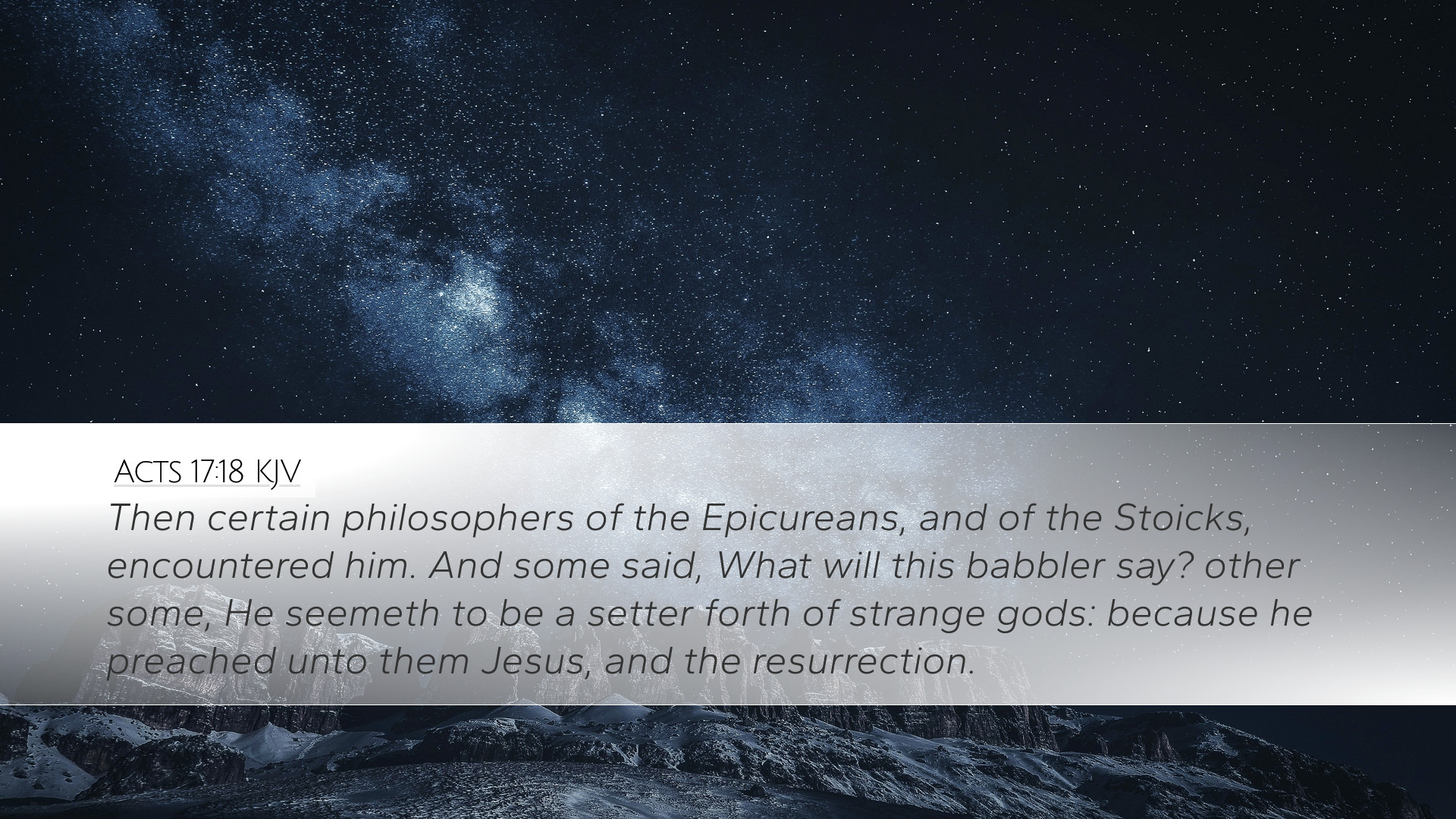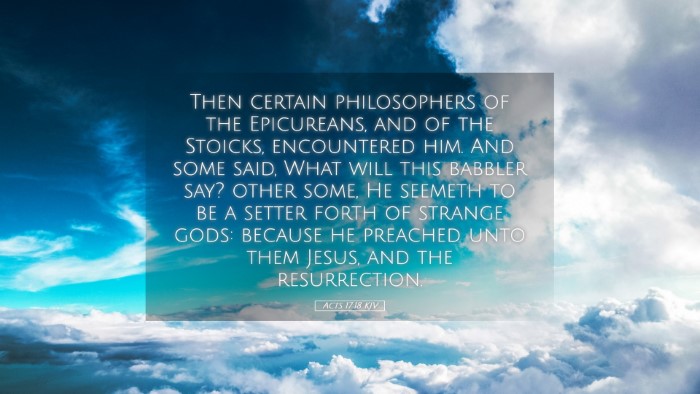Commentary on Acts 17:18
Verse Reference: Acts 17:18 - "Then certain philosophers of the Epicureans, and of the Stoics, encountered him. And some said, What will this babbler say? other some, He seemeth to be a setter forth of strange gods: because he preached unto them Jesus, and the resurrection."
Introduction
The encounter of Paul with the philosophers in Athens, as recorded in Acts 17:18, provides a rich canvas for theological reflection and exegesis. This verse introduces various philosophical schools of thought that engaged with the Apostle Paul, highlighting the clash of ideas prevalent in a diverse cultural milieu.
Contextual Background
- Athens as a Cultural Hub: Athens was renowned for its intellectual achievements and diverse philosophical schools.
- Philosophical Schools:
- Epicureans: Focused on the pursuit of pleasure and the avoidance of pain, often dismissing the idea of divine intervention.
- Stoics: Advocated for rational living in accordance with nature and emphasized virtue and self-control.
The Encounter with Paul
This encounter illustrates the varied responses to the Christian message in a polytheistic and philosophical environment. Paul’s preaching of Jesus and the resurrection provokes questions and curiosity among the Athenians.
The Philosophical Response
1. Philosophical Inquiry: The text presents a vivid depiction of the intellectual curiosity of the Greek philosophers. They regarded Paul as a “babbler,” an outsider whose ideas were strange and unfamiliar.
2. Perception of Strange Gods: Paul’s mention of the resurrection was particularly perplexing to them, as it challenged their existing worldviews. The phrase "strange gods" reflects their encounter with concepts that were alien to their understanding of divinity.
Commentary Insights
Various public domain commentators provide rich insights into this passage:
Matthew Henry
Henry notes the opposition Paul faced as emblematic of early Christian evangelism. He emphasizes that the perception of the philosophers signifies both a rejection of the Gospel and a reflection of their philosophical ignorance. Henry encourages believers to expect similar responses when engaging with secular or philosophical thought.
Albert Barnes
Barnes highlights the significance of Paul’s message in contrast to the philosophical teachings of the time. He elucidates that the resurrection represents the core of Christian doctrine, which was met with skepticism and intrigue. Barnes posits that this encounter illustrates the struggle of faith against human wisdom, underscoring the necessity of divine revelation.
Adam Clarke
Clarke provides a detailed exploration of the terms used by the philosophers, explaining how their skepticism towards new ideologies often led them to dismiss genuine spiritual truths. He emphasizes the importance of being prepared to explain and defend the Gospel in a world filled with competing ideologies.
Theological Reflections
This verse serves as a theological pivot point that challenges modern believers to consider the relevance of the Gospel in contemporary philosophical discourse. Just as Paul engaged with the Athenians, so too must modern theologians and pastors engage with the prevailing thoughts of our age.
Key Themes:
- The Nature of God: The philosophers' questioning of Paul reflects humanity's search for truth and divinity.
- Resurrection as a Central Tenet: The dismissal of Jesus’ resurrection highlights the importance of this doctrine in Christianity.
- Engagement with Culture: This passage exemplifies the call for Christians to interact with their cultural contexts thoughtfully and meaningfully.
Conclusion
Acts 17:18, while simply stating an event in Paul's travels, encapsulates a larger narrative of the early church's engagement with the world. The responses Paul received from renowned philosophers provide insights into the nature of evangelism, the challenges of presenting the Gospel in diverse philosophical landscapes, and the imperative for believers to articulate their faith amidst skepticism. The encounter serves as a reminder of the need for wisdom, discernment, and courage as we engage with the ideologies of our time.


